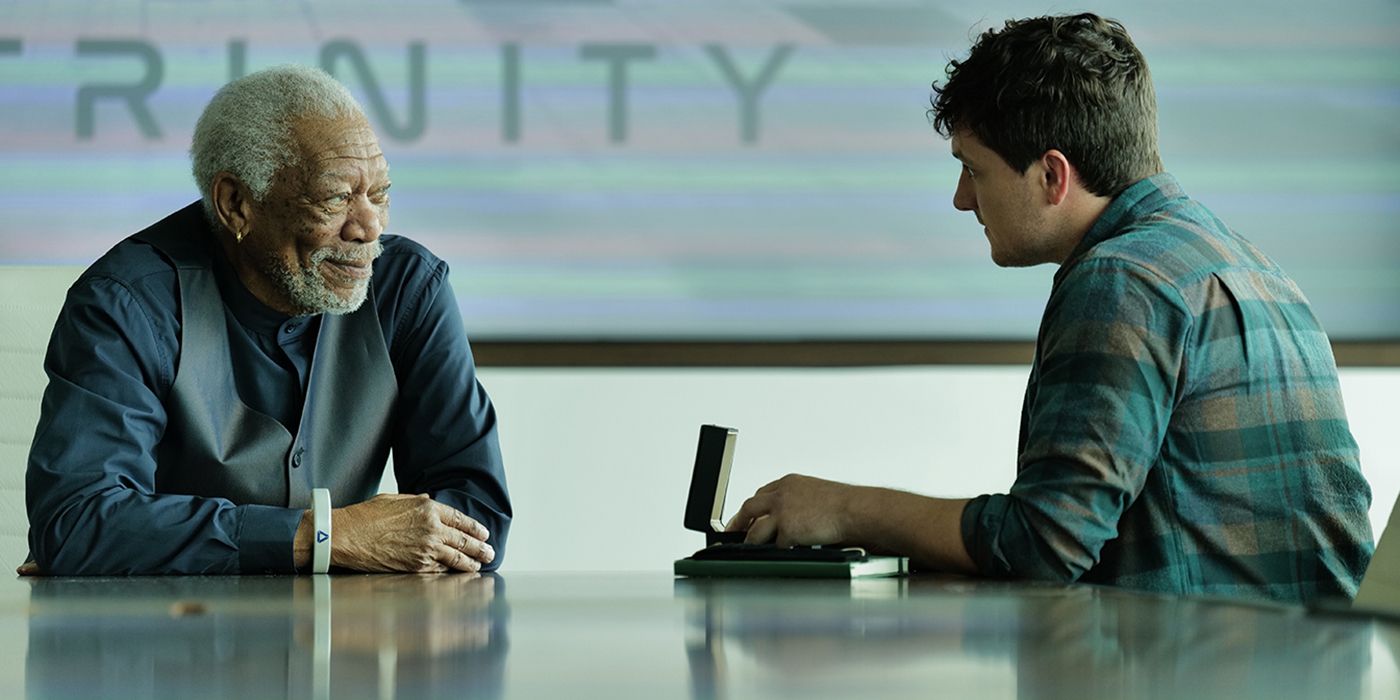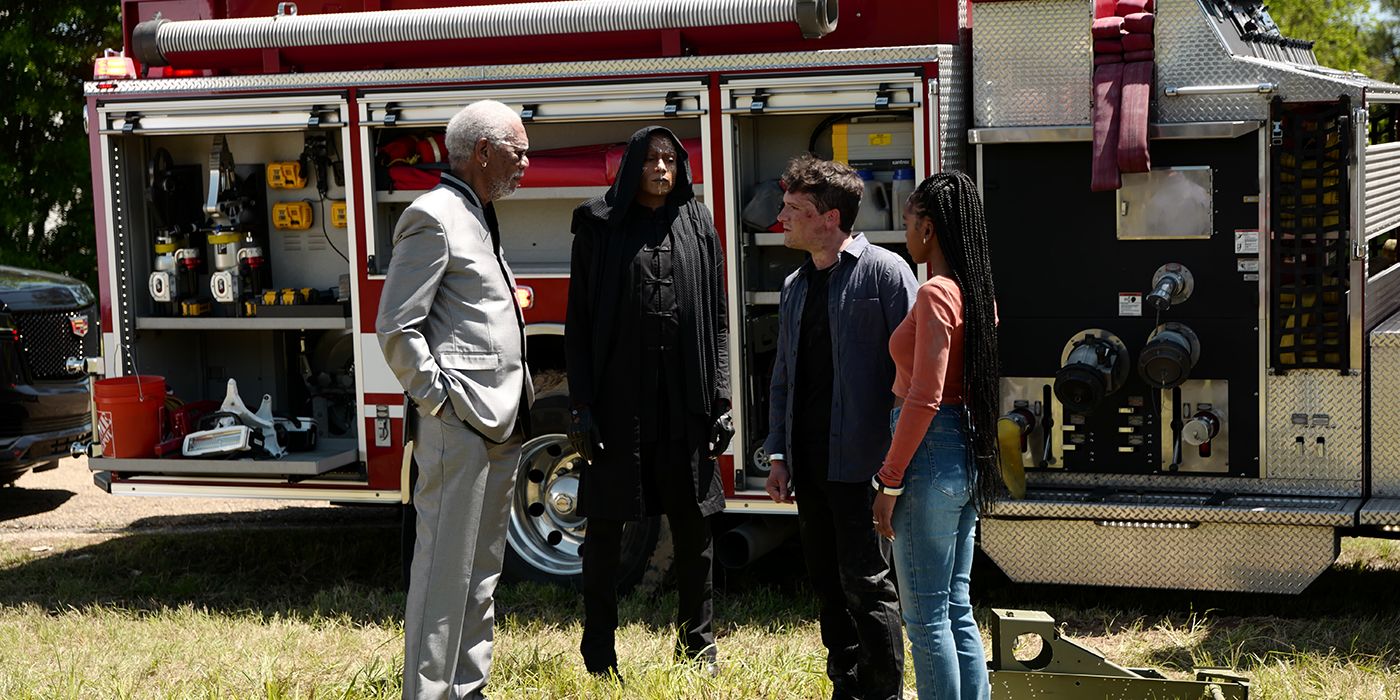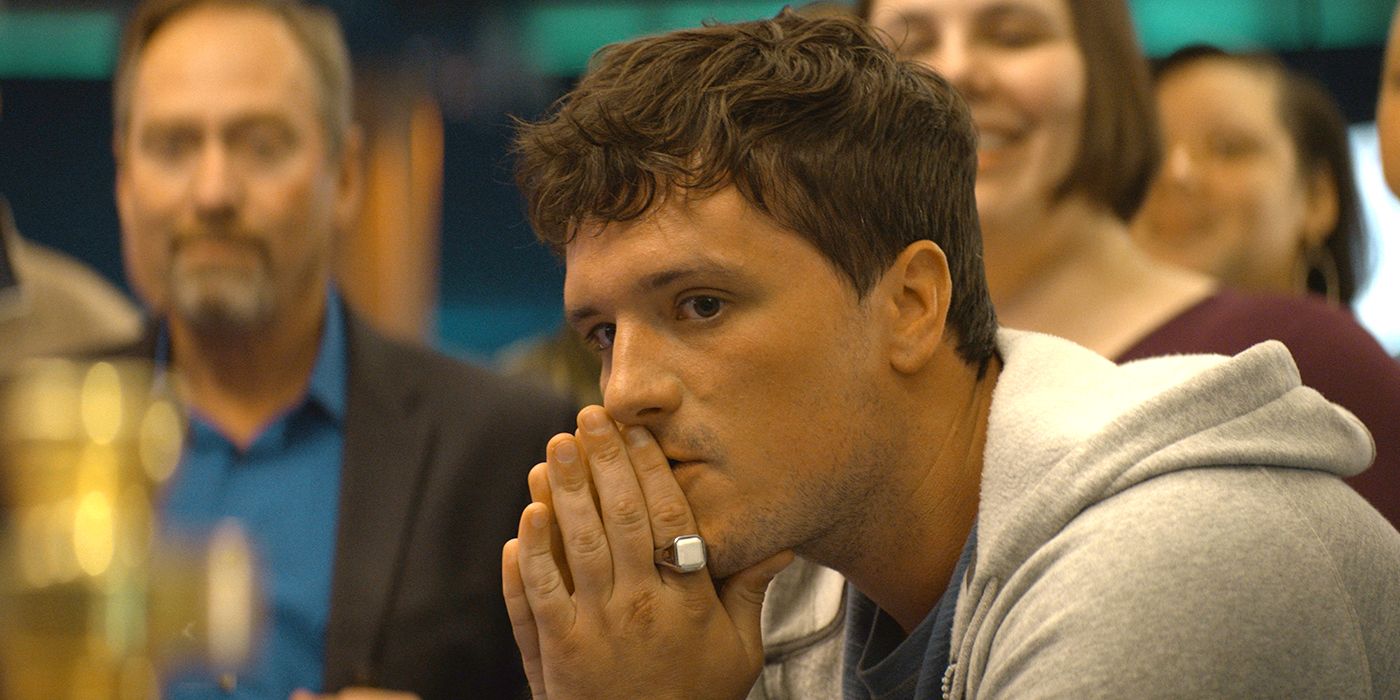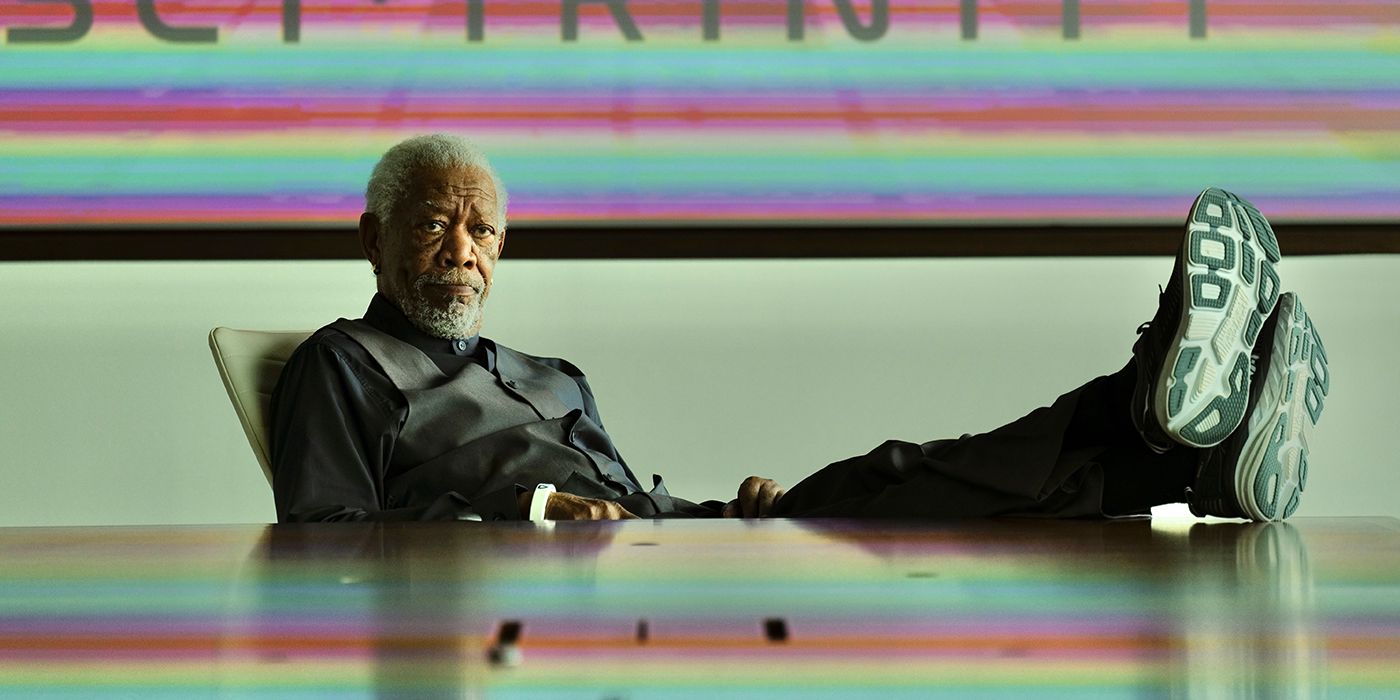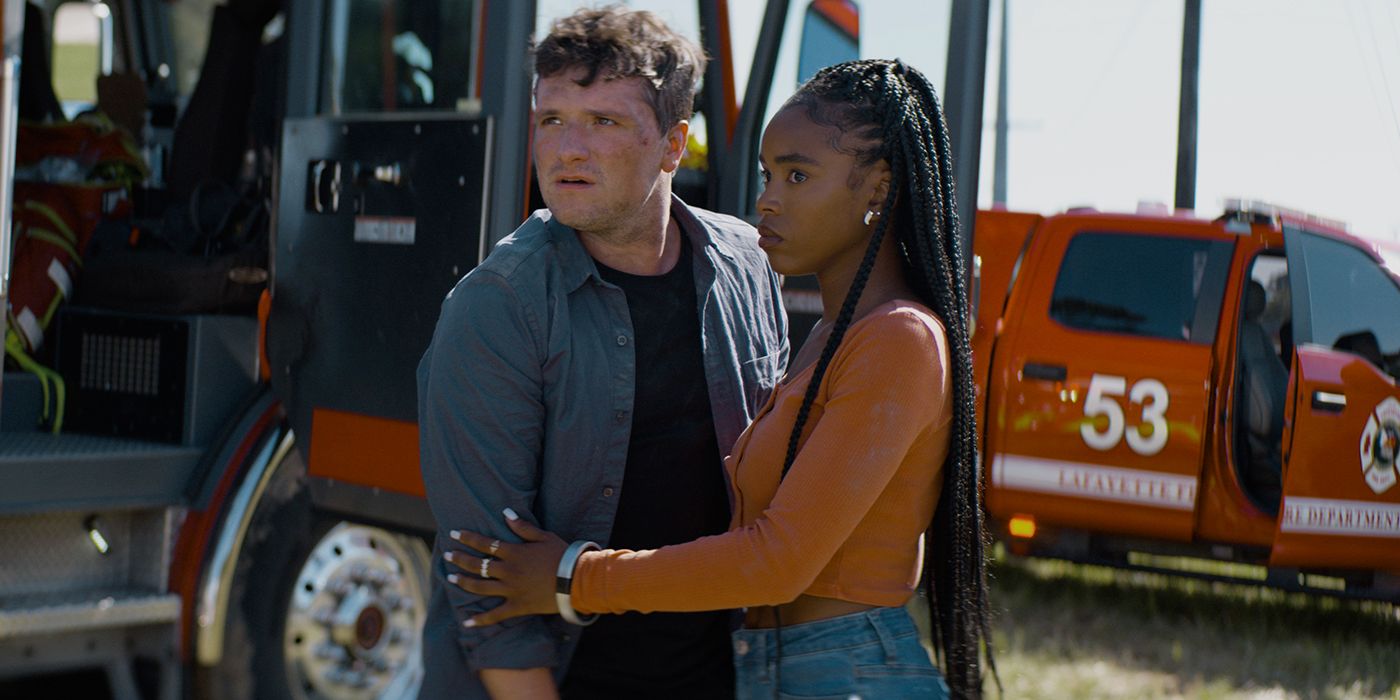Summary
- 57 Seconds is a unique twist on the time travel genre, following a tech blogger who gains the ability to travel 57 seconds into the past.
- The sci-fi thriller explores timely themes, including the negative effects of Big Pharma, while delivering thrilling time-travel action.
- The film features an ensemble cast including Josh Hutcherson, Morgan Freeman, and Lovie Simone, and was directed by Rusty Cundieff, known for his work on horror anthologies, including his co-created Tales from the Hood.
The time travel genre gets a unique twist in 57 Seconds. Based on E.C. Tubb's short story "Lucifer," the sci-fi thriller centers on a troubled tech blogger as he gets his hands on a ring that allows him to travel 57 seconds into the past, initially using it to make a better life for himself before setting his sights on a target with ties to his past.
Five Nights at Freddy's' Josh Hutcherson leads the ensemble 57 Seconds cast alongside Morgan Freeman, Greg Germann, Lovie Simone, Bevin Bru, Sammi Rotibi, Mark Jacobson, Griff Furst, D.A. Obahor and Jeff Chase. Helmed by Tales from the Hood creator Rusty Cundieff on a script he drafted from a prior version penned by Green Room's Macon Blair, the sci-fi thriller holds some timely themes amidst its time-travel thrills.
Ahead of the movie's premiere, Screen Rant spoke exclusively with director co-writer/director Rusty Cundieff to discuss 57 Seconds, Josh Hutcherson's Everyman personality, Morgan Freeman's dedication to the movie and his potential Creepshow return.
Rusty Cundieff Talks 57 Seconds
Screen Rant: It's great to meet you, Rusty, and get to talk about 57 Seconds, it's quite the interesting little thriller. Now, you are typically known for your work in a lot of horror anthologies, especially the Tales from the Hood franchise. What about this project in particular really sparked your interest to want to be a part of it?
Rusty Cundieff: Well, I've always liked thrillers, and I like sci-fi, so it was a nice change [of pace]. And honestly, some of the aspects of directing horror and sci-fi are similar anyway. But, yeah, I kind of dug the darkness of the story, too, the idea of having something that takes you back 57 seconds, what you could do with that amount of time — which isn't a lot when it really comes right down to it — and how changes done in 57 seconds, brief changes, can make a dramatic difference for not just you, but those around you, the world in general, depending on how used.
I did like the twist of having it only be 57 seconds versus anything bigger for most of the movie, it was a really fresh take on the time travel element. Now with that said, time travel movies can often come with a lot of major rules that both the story and the filmmaker has to follow. What was that was like for you and Macon Blair, who I saw is also a co-writer on this, laying down that groundwork and those ground rules for yourselves?
Rust Cundieff: Yeah, well, the film was taken from a short story called "Lucifer" by E.C. Tubb, he had created these rules within the short story. So, he had created this ring that got found, went back 57 seconds, but then there was a latency period where you had to wait before you could tap it again. I think probably what we added to try and make that a little easier to visualize was the ring turning colors between when you could use it and when it was kind of resetting itself, I guess for lack of a better word. That wasn't in his short story, but it was a way to kind of visually say, "Oh, the ring is not usable during that period." Now, did we, in every single instance, get that 57 seconds right on the nose when Franklin could use it? Eh, maybe not. [Chuckles] But the concept is there, and the idea of latency is there, so that was probably the most important thing, because what is also in the short story is the plane going down at the end, which we use. It was really important at that point, now that we had introduced the villain to the story that wasn't actually in the short story, but is now in the film. It's how Franklin kind of lets go and metes out justice, ultimately, at his own expense at the end of the film. So, it was really important to have that, actually, and I'm sure I'm not the first person to say that actually having ground rules really, in some ways, opens up what you can do, as opposed to being able to do everything, then nothing matters anymore.
Yeah, having rules for time travel is just as much fun to explore as it can be without. Now, in speaking of the villain, I did appreciate the timeliness of the story in dealing with Big Pharma and a lot of the negative effects that it's had on this country as a whole. Did you have other ideas in mind for how to explore that theme, or was that always the villain that you had in mind for this?
Rusty Cundieff: No, we went around and about on it. The short story is exceedingly kind of personal and dark, because it follows one guy who found the ring, he's a bit of an a----le, honestly. [Chuckles] There's really not any redeeming qualities to that guy, and so, I think the first pass of the script and Macon's first pass on it was more centered in that way. I think the character did have some aspects of him that you liked, but it was a pretty dark journey down a rabbit hole for this guy. By the way, [the first script was] really well written and amazing, but I'm trying to find something that would work in the marketplace, which isn't as accepting of antiheroes and dark stories as some of us might like. We tried to find a way to kind of open it up a bit and give Franklin, Josh Hutchinson's character in the film, something that you could root for him, because of something that he was doing. Giving him a villain, something to work against, seemed like an obvious thing. Now, there was a draft that was practically all political, and it was dealing with a race for governor or something, I can't even remember what it was. That was kind of something that was there before I came on, and once I came on, I was kind of looking at that, and I understood why they did that. But it became kind of a big, messy thing, it was hard to follow. So, I was trying to just kind of streamline it, find a villain that was easily understood, and because of what was going on with the Sacklers and oxy at that time, it seemed like an easy target. Then, giving Franklin something to fight for, so a sister has died because of this drug, and now you have something where it's like, "Oh, he could get this cool thing, he has the desire to use it for good." But the idea that absolute power corrupts absolutely was a way to play around with him, the ring, his villain, who he's after, but then this kind of angel on the other side, [where] the scales of justice kind of go like this [motions unbalanced]. You kind of go, "Well, I think he's a good guy, he seems like a really nice guy, but maybe he's not." So, it puts Franklin in the middle of that and kind of ups his moral journey. Hopefully, it gives people a reason to root for him while they watch him kind of on his descent into bad decisions.
Now, Josh is someone who I've appreciated his work ever since Bridge to Terabithia as a kid, and I've seen him grow and do so many amazing things. How challenging was it for you to find the perfect lead actor to embody that moral tug-of-war, like you were just discussing?
Rusty Cundieff: Well, it was difficult, it was a difficult discussion. In the versions of the script prior, too, because they were much darker than this one, we knew we were kind of walking that line between light and dark. I think he was one of the first people that came to mind once we had that version of the story, because he's such a good Everyman. It's easy to imagine yourself as him, some guys you look at — I'm not saying that Josh is not handsome, but he's not that unattainable handsome. He's a decent-looking guy with kind of Everyman values in a lot of the roles that he's had, so he seemed like a really good choice from that standpoint. Lucky for me that we got him that he's just a wonderful actor and a great guy to have on set. He's really smart, he comes super prepared, and he gets the job done, I can't speak highly enough about Josh.
I love that you got to have that collaborative experience with him, and I totally agree on his Everyman accessibility. Even coming up in Five Nights at Freddy's, he feels like such a normal guy, and I can't wait for that one. Now, you, of course, also have Morgan Freeman in this movie, and even in a lot of indie productions like this, he always brings that gravitas that he's known for. What was it like approaching him for this and talking about this character with him?
Rusty Cundieff: Yeah, Morgan read one of the drafts with the pharmaceutical angle in it, and really liked it. The trick to getting him to ultimately say yes to the role was trying to find some sort of real science that connected to time travel. He's a stickler for having real science in things, and I'm like, "Well, you know, it's time travel. It's magic. I don't know, who knows how this thing happened." [Chuckles] But he was adamant about it, so we ended up having to talk to some physicists and some people in the scientific community and there are kernels. Would it happen the way it happens in the movie? I doubt it, probably. But we found enough to ground it in real science to get Morgan to say yes to the role. And once he showed up, he was just in 100%, there's a scene where someone tries to shoot at him, he ends up on the ground of a stage. I can remember the majority of our crew [said], "Well, Morgan, you don't have to do, that we got a stunt guy, it's gonna be fine." I didn't say that to him, because I had talked to him, and I knew what he was about as an actor. But what was funny was, he ends up down there, and my DP rushes over, he's like, "Oh, Mr. Freeman, Mr. Freeman, you don't have to get on the ground. Trust me, it's, it's fine." And Morgan looked up at him and said, "Does the script say that I'm on the ground? I'm on the ground." [Laughs] So you really just have to love someone of his age, and his prestige in the industry, and what he brings being just that committed to our little movie, it was wonderful to work with him.
Now, did you feel his push for the realism and the extended research into the science benefited the movie as far as making it easier to explain for audiences?
Rusty Cundieff: Yeah, what it did was it created, I guess I would call it a logic, but an understanding for Burrell, who was Morgan's character in the movie, Anton Burrell. Because he has to explain what this thing does, and so it kind of forced us to come up with what that was. We would have had something anyhow, but everything would have been made up from fairy dust. But this way, you're at least grounding it in something that is real, and it actually helped in congealing the idea of how this thing works. Now, most people aren't going to know which part is real or not, but it was helpful in terms of writing the explanation. It was definitely helpful for Morgan, because it gave him a sense of how this happened, and in fact, it helped me in terms of I told Morgan — at one point, this was in the script, his backstory, and we kind of lost it, we didn't feel like we needed it to be actually said in the story. But, his backstory was that he was a young guy whose father died when he was young, and he had been kind of chasing science since then. He had found this thing because of the death of his father, he wanted to be able to go back and meet his father. Now, 57 seconds, the way it works wouldn't get you there, but that's how we stumbled upon it. The interesting thing was after I gave him that, I was doing some research online, and there was a Black astrophysicist whose father died, and he's one of the few who is doing anything in theory about time travel, so it was kind of like, "Oh, this guy exists!"
That's a cool parallel to discover! Before I let you go, I did want to ask, I've been a big fan of Creepshow since it launched, and I've loved that you've gotten a couple episodes on it. I know season 4 is on its way, but I don't believe they've announced the directors yet. Are you returning?
Rusty Cundieff: I haven't heard anything, I would love to. I think things have shifted a little, I think they were shooting when I shot in Atlanta. I think I had a chance on the last season, but I was in Canada shooting, ironically, they're now shooting I believe in Canada, I think they're in Vancouver. So, I don't know, fingers crossed. I loved working with Greg Nicotero, I actually went to high school with Greg Nicotero, believe it or not, or the same high school. I think he might have been a little in front of me. Put my age down, Greg's up, there you go. But working on Creepshow was an absolute blast, because my first studio film, Tales from the Hood, had all practical effects in it, with the exception of, I think, the devil's tongue at the end, which today looks so terrible. [Laughs] But being able to work with Greg, his whole thing is all practical effects stuff, so it was so much fun to go back into that world and have to figure things out in camera, or what you're going to do to manipulate the footage that you've actually shot as opposed to talking to someone with a sketchpad and going, "Well, we could put this here, and the hand comes from there," and all of that stuff. Personally, I think practical effects, for some reason, look creepier. Digital can look fantastical, but it rarely, to me, looks creepy.
I couldn't agree more. For Halloween, I've been rewatching plenty of the old classics, and movies like American Werewolf in London still creep me out because of their prosthetics. So, between Tales from the Hood and Creepshow, you've tackled many different kinds of horror stories. Is there any one in particular that you would love to go back to or that you haven't explored yet?
Rusty Cundieff: There is a stack of stories that I have — my co-writer on Tales from the Hood, he has some too — that we had written for different iterations of Tales from the Hood. Some that we tried to get into the two that we shot after the first one, but could not do because of budget concerns. Obviously, Tales deals with a lot of politics, there's things that they wouldn't let us do because of political concerns, believe it or not. So yeah, there's a number of stories, and I'd like to do some of them now. I'm just trying to write short stories, and hopefully I'll publish them as short stories or something, and then I'm also talking to someone about potentially a graphic novel, which would take some of these ideas and play around with them, like the old EC comics stuff used to do.
About 57 Seconds
Josh Hutcherson (The Hunger Games) and Academy Award® winner Morgan Freeman (Million Dollar Baby) star in this heart-racing action thriller. When a tech blogger discovers a time-altering device, he unleashes its power to rewrite the past and seek revenge against the ruthless corporate empire that destroyed his family. But his actions soon trigger a terrifying chain of events, propelling him into a pulse-pounding battle for survival where every second counts.
57 Seconds is now in select theaters and on digital platforms.
Source: Screen Rant Plus

